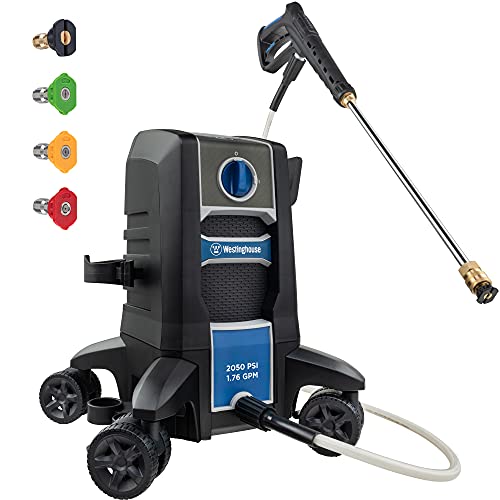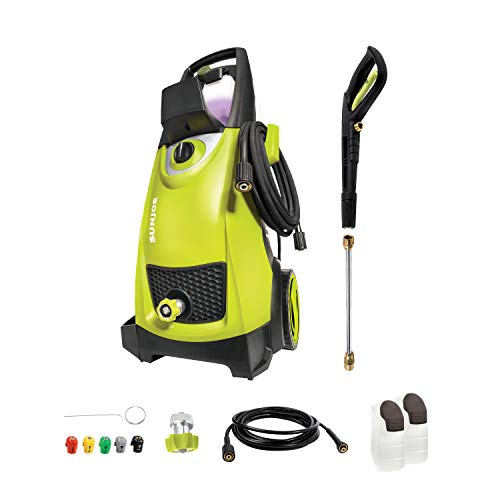Best Pressure Washer Under 200 Of 2024: Completed List
Brandon Forder Apr 26, 2024 2:15 AM
Power washers, or pressure washers, are useful for cleaning a wide range of surfaces. Use them to power-wash the driveway, wash the car, or clean the patio set. They serve an important purpose, but the cost may be prohibitive for some.
The Karcher K5 M PRO, for instance, is my go-to pressure washer due to its robust engine and assortment of optional attachments, which allow it to serve a wide variety of purposes. There are, however, alternatives available if you don't want to spend more than $500 on a pressure washer.
When it comes to pressure washers, the Sun Joe SPX3000 is your best bet for under $200. It has a powerful brushless induction motor for efficient cleaning of hard floors and other surfaces. Working in confined locations is no problem because to the 31-pound lightness and 35-foot power cord.
The best pressure washers that can be purchased for less than $200 are discussed in detail in this article.

Compare Products
- SCORE9.4
- BrandWORX
- Prime
Last update on 2024-04-26 / Affiliate links / Images, Product Titles, and Product Highlights from Amazon Product Advertising API
Types
Electric pressure washers
Most residential cleaning tasks, including washing vehicles, scrubbing patio furniture, and spot-treating concrete, are well-suited to electric pressure washers. They are less expensive (often $300 or less), less bulky, less noisy, and less demanding on upkeep and storage space.
Gas pressure washers
Professionals typically use gas-powered pressure washers due to their superior strength. Use them for decks and sidewalks, as they will blast practically any dirt and debris, but they are significantly more expensive (at least $300) and cumbersome to maintain due to their size, weight, noise, and complexity.
Power
The amount of power a pressure washer has is arguably the most crucial factor in determining how well it will clean. Calculating the machine's cleaning capacity with a formula is the quickest method (CU). (It may or may not be displayed on the packaging.) To calculate the machine's output in gallons per minute (GPM), multiply the PSI rating by 8. The greater a device's CU, the more effective it is in cleaning.
PSI
When pressure washing, the PSI is crucial since it determines how much force the water will have on the surface. If the PSI is too high, you risk ruining the surface you're scrubbing. Light-duty pressure washers have a PSI between 1,000 and 2,000, whereas medium-duty washers have PSI between 2,000 and 2,800. When it comes to pressure washers, anything over 2,800 PSI is considered a heavy duty model.
Water flow rate (GPM)
When shopping for a pressure washer, it's also crucial to consider the water flow rate. The rate of water flow is expressed as a number of gallons per minute, or GPM. Pressure washers with higher GPM and PSI ratings remove dirt and grime off surfaces more quickly than those with lower ratings.
Build Quality
The machine's construction should be sturdy enough to resist the demanding conditions of the workplace. Quality of construction is a leading indicator of how long and reliably an appliance will serve its owner.
The vast majority of electric pressure washers are made of plastic. Therefore, caution should be used when using electrical machinery because of its lower durability. However, plastics can come in a variety of types and grades. All of the pressure cleaners on this list have been thoroughly examined for quality. The use of electric pressure washers in a business setting is not recommended.
Frames for gasoline-powered pressure washers typically consist of steel, aluminum, or metal that has been welded together. This means that the machines are robustly constructed and of relatively high quality. This is why commercial establishments frequently employ gas pressure washers when conducting extensive cleaning.
Nozzle
Most pressure washers have a dial-type, variable spray pattern nozzle, or three or four color-coded nozzle tips. There is a wide variety of nozzle angles available, from 0 degrees (which sprays a quarter-sized area with a direct jet of water) to 65 degrees (which uses a larger opening to decrease velocity and increase hose pressure). When power washing, the spray can easily cause harm to the surface if the nozzle's range is set too low.
Hot vs. cold water
Compared to its hot water equivalents, cold water pressure washers are simpler to operate, cheaper, and more transportable. However, a hot water pressure washer can clean more efficiently with less water and detergent. A hot water pressure washer can be used to clean and disinfect hard surfaces.
Cost
There are pressure washers available for less than $100, but the cheapest of the types we recommend is closer to $150. You can spend as much as $600 or more on a pressure washer, but our experts agree that the best models for private households can be purchased for $300 to $500. According to Bailey Carson, Property Care Expert at Angi, the usual rate for a professional to come and pressure wash your home is anything from $25 to $100 per hour. That's just $250, which means the equipment pays for itself after cleaning only one patio or deck.
Safety
It's important to recognize the might of these robots, adds DiClerico. If you don't know what you're doing, "There's a higher risk of injury and surface damage if you don't know what you're doing." Always use caution when operating a pressure washer, and never remove protective gear like goggles or shoes with open toes. And if your device has multiple nozzles, start with the weakest one and work up to the stronger ones if necessary. Keep yourself at least four feet away from the surface you're cleaning at all times. When in doubt, spot test an inconspicuous area first to verify the spray won't damage the surface. Our experts also suggest to stay away from the zero-degree spray (always the red one in the set), since the extremely concentrated spray is enough to break the surface of the skin. A wider spray will take more time to clean the same area as a narrower one.
What is a pressure washer?
A pressure washer is an electrical or gas-powered cleaning appliance. A pressure cleaning or power washer is another name for this tool. A motor drives a pump, which then forces water through a narrow nozzle at a high pressure. This high-pressure spray has tremendous cleaning power, and can quickly blast away dirt and grime from surfaces such as decks, driveways, and patios, among others. Cleaning outdoor furniture, siding, and other surfaces with a pressure washer requires far less time and effort than would be required with a soapy bucket and a scrub brush.
Is 2000 PSI enough to clean a driveway?
A pressure washer with a 2000 PSI rating is absolutely adequate to clean a driveway. Selecting the proper nozzle and cleaning solution for your concrete is essential for getting the work done fast and efficiently.
Which is more important PSI or GPM in pressure washer?
The PSI tells you how much force your power washer will use to clean, while the GPM tells you how fast it will be delivered.
In comparison to a 2,000 PSI washer with a 1 GPM flow rate, a 1,000 PSI washer with a 2 GPM flow rate will be able to deliver twice as much water.
Do I need an expensive pressure washer to get my job done?
You don't have to go into debt to buy a pressure washer that works for you, despite the fact that they can range in price from dirt cheap to extravagant. Features, such as nozzle attachments and PSI + GPM, make up the bulk of the price difference between power washers. If you're only cleaning your driveway or patio, a less powerful (and therefore cheaper) pressure washer will do. Light and medium-duty cleaning tasks benefit most from pressures about 2,000 PSI, and there are several affordable choices available.
How much PSI do I need to power wash my driveway, deck, or concrete?
To clean a driveway effectively, you need a pressure washer with a PSI between 2000 and 2800 and a flow rate of 2-3 gallons per minute (GPM). These characteristics are typically seen in medium- to heavy-duty pressure washers. A less powerful pressure washer might still be able to clean your driveway, but it might take more passes and more time.
A machine with 1300 to 2000 PSI and 2 GPM is ideal for pressure washing a deck. Light-duty pressure washers often have these specifications, but you can use a medium- or heavy-duty pressure washer to clean your deck if you're careful with the spray force.
Concrete cleaning requires a medium or heavy-duty washer with a flow rate of at least 2.5 GPM and a pressure of 2000-3000 PSI.
Our best wishes are that you've been able to locate the ideal pressure washer. Check out our buyer's guide if you're having trouble making a choice. You'll learn what to look for in a quality electric pressure washer and how it may make cleaning a lot less of a hassle for you and your neighbors who may be sensitive to the exhaust from gas-powered models.


























